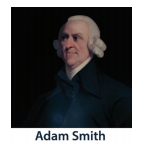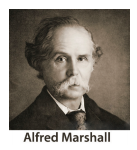Chapter: 11th Economics : Chapter 1 : Introduction To Micro-Economics
Economics: Its Nature
Economics: Its Nature
The nature of a subject refers to its contents and how and why they find a place in the subject. This nature is understood by studying the various definitions given by the notable economists. The existence of multiplicity of the definitions makes some scholars comment that a search for a clear definition of Economics is an exercise in futility. J. M. Keynes, for example, observes that“Political Economy is said to have strangled itself with definitions”. Their presence makes studying a subject interesting, exciting, enjoyable, or worthwhile. In fact, their presence in a social science subject is a clear sign of the growth of the science. It indicates that there exists freedom for people associated with such as science to formulate fresh definitions. These associates appreciate and make use of the opportunity afforded to them and come up with a plethora of definitions saying: ‘The more, the merrier’. Each definition represents a unique generalisation. A wide variety of definitions paves the way to arrive a near-complete agreement on the subject-matter of Economics.
A science grows stage by stage, and at every stage, its newer definition emerges and a concept associated with it receives some special emphasis. However, the study of a subject is made possible when it possesses its clear cut definition and boundary.
Four definitions, each referring to particular stage of the growth of the subject of Economics, are presented here. They are:
1. Smith’s Wealth Definition, representing the Classical era;
2. Marshall’s Welfare Definition, representing the Neo-Classical era;
3. Robbins’ Scarcity Definition, representing the New Age; and,
4. Samuelson’s Growth Definition, representing the Modern Age.
1. Wealth Definition: Adam Smith
Adam Smith (1723-1790), in his book “An Inquiry into Nature and Causes of Wealth of Nations” (1776) defines “Economics as the science of wealth”. He explains how a nation’s wealth is created and increased. He considers that the individual in the society wants to promote his own gain and in this process, he is guided and led by an “invisible hand”. He states that every man is motivated by his self interest This means that each person works for his own good.

Smith favours the introduction of “division of labour” to increase the quantum of output. Severe competition in factories and society helps in bettering the product. Supply force is very active and a commodity is made available to the consumers at the lowest price.
The publication of Adam Smith’s “The Wealth of Nations” in 1776, has been described as “the effective birth of economics as a separate discipline”.
Criticism
For Smith, Economics consists of ‘wealth-getting’ activities and ‘wealth -spending’ activities. An undue emphasis is given to material wealth. Wealth is treated to be an end in itself. This view leads him to ignore human welfare as an essential part of Economics. Smith gives his definition when religious and spiritual values are held high. Ruskin and Carlyle regard Economics as a ‘dismal science’ , “pig science” etc. as it teaches selfishness which is against ethics.
2. Welfare Definition: Alfred Marshall
Alfred Marshall (1842-1924) in his book “Principles of Economics” (1890) defines Economics thus: “Political Economy” or Economics is a study of mankind in the ordinary business of life; it examines that part of individual and social action which is most closely connected with the attainment and with the use of the material requisites of well-being. Thus, it is on one side a study of wealth; and on the other, and more important side, a part of the study of man.”

The important features of Marshall’s definition are:
a. Economics does not treat wealth as the be-all and end-all of economic activities. Man promotes primarily welfare and not wealth.
b. The science of Economics contains the concerns of ordinary people who are moved by love and not merely guided or directed by the desire to get maximum monetary benefit
c. Economics is a social science. It studies people in the society who influence one another.
Criticism
a. Marshall regards only material things. He does not consider immaterial things, such as the services of a doctor, a teacher and so on. They also promote people’s welfare.
b. In the theory of wages, Marshall ignores the amount of money that goes as reward for the services of ‘immaterial’ services.
c. Marshall’s definition is based on the concept of welfare. But it is not clearly defined. Welfare varies from person to person, country to country and one period to another. Marshall clearly distinguishes between those things that are capable of promoting welfare of people and those things that are not. Things like liquor that are not capable of promoting welfare but command. a price, come under the purview of Economics.
d. However, welfare means happiness or comfortable living conditions of an individual or group of people. The welfare of an individual or nation is dependent not only on the stock of wealth possessed but also on political, social and cultural activities of the nation.
3. Scarcity Definition: Lionel Robbins
Lionel Robbins published a book “An Essay on the Nature and Significance of Economic Science” in 1932. According to him,“Economics is a science which studies human behaviour as a relationship between ends and scarce means which have alternative uses”.
The major features of Robbins’ definition are:
a. Ends refer to human wants. Human beings have unlimited number of wants.
b. On the other hand, resources or means that go to satisfy the unlimited human wants are limited or scarce in supply. The scarcity of a commodity is to be considered only in relation to its demand.
c. Further, the scarce means are capable of having alternative uses. Hence, an individual grades his wants and satisfies first his most urgent want. Thus, Economics, according to Robbins, is a science of choice.
Criticism
a. Robbins does not make any distinction between goods conducive to human welfare and goods that are not. In the production of rice and alcoholic drink, scarce resources are used. But the production of rice promotes human welfare, while that of alcoholic drinks does not. However, Robbins concludes that Economics is neutral between ends.
b. Economics deals not only with the micro-economic aspects of resource-allocation and the determination of the price of a commodity, but also with the macro-economic aspects like how national income is generated. But, Robbins reduces Economics merely to theory of resource allocation.
c. Robbins’ definition does not cover the theory of economic growth and development.
4. Growth Definition: Samuelson
Paul Samuelson defines Economics as “the study of how men and society choose, with or without the use of money, to employ scarce productive resources which could have alternative uses, to produce various commodities over time, and distribute them for consumption, now and in the future among various people and groups of society”.
The major implications of this definition are as follows:
a. Like Robbins, Samuelson states that the means are scarce in relation to unlimited ends and that such means could be put to alternative uses.
b. Samuelson makes his definition dynamic by including the element of time in it.
Therefore, his definition covers the theory of economic growth.
c. Samuelson’s definition is applicable also in a barter economy, where money is not used.
d. His definition covers various aspects like production, distribution and consumption.
e. Samuelson treats Economics as a social science, whereas Robbins regards it as a science of individual behaviour.
Of all the definitions discussed above, the ‘growth’ definition stated by Samuelson appears to be the most satisfactory.
Related Topics

